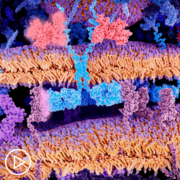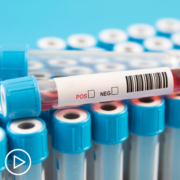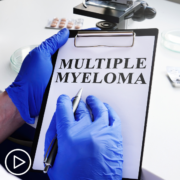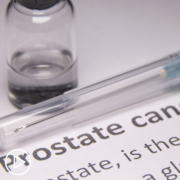Advances in Myeloma Treatment | CAR T-Cell Therapy and Bispecific Antibodies
Advances in Myeloma Treatment | CAR T-Cell Therapy and Bispecific Antibodies from Patient Empowerment Network on Vimeo.
How are new treatments impacting the landscape of myeloma care? Dr. Francesca Cottini explains the role of bispecific antibody therapy and CAR T-cell therapy and how these emerging therapies are changing myeloma care.
Dr. Francesca Cottini is Assistant Professor in the Division of Hematology at the Ohio State University Comprehensive Cancer Center. Learn more about Dr. Cottini.
Related Programs:

|

Making Treatment Decisions | Understanding Common Myeloma Therapies |
Transcript:
Katherine:
Dr. Cottini, I’m wondering if you could briefly go over CAR T-cell therapy and bispecific antibodies.
Dr. Cottini:
Yes, of course. So, these are all our new therapeutic approaches for patients. And these are types of treatments that are given to patients that already went through their induction, they went into remission, maybe they had a bone marrow transplant.
And then, after a couple of years or months, unfortunately, the disease came back, and they need the new and different treatment options. So, these two strategies, CAR T and bispecific antibodies, really rely on the T-cells, on the immune cells of the patient.
And they all focus and target a specific marker on the plasma cells, but they work a little bit differently. So, the bispecific antibodies – and we have different antibodies.
Some are approved by the FDA, some are just in clinical trials. They practically recognize something that is on the plasma cells, on the myeloma cells, that can be BCMA, GPRC5D, or other targets. So, at the same time that I am able to get close by the T cells, the immune cells, and in this way, practically there is both the antibodies and also the immune cells which is activating and getting rid of the cancer cells.
So, these are infusions. Often, they’re done initially in the hospital and then in the outpatient setting. Sometimes it’s even every week, every other week or so.
CAR T are different strategies, and it’s a very smart way of trying to get rid of the cancer cells. So, practically, these are T cells.
So, these are immune cells from you, from the patient. And they are practically taken and then brought to a very specific and clean facilities where these T cells are modified in order to be able to recognize the cancer cells.
And then these cancer cells are sent back to us, and then practically they are given into the veins to patient, and then there is this kind of reaction of these T cells, which are very peppy and aggressive to be able to kill all the remaining cancer cells. So, these are all the new strategies.
Obviously, we are kind of like in the early process, but these are very promising therapies I think we’ll be maybe moved up front even with diagnosis in the next 10, 20 years, we don’t know.











